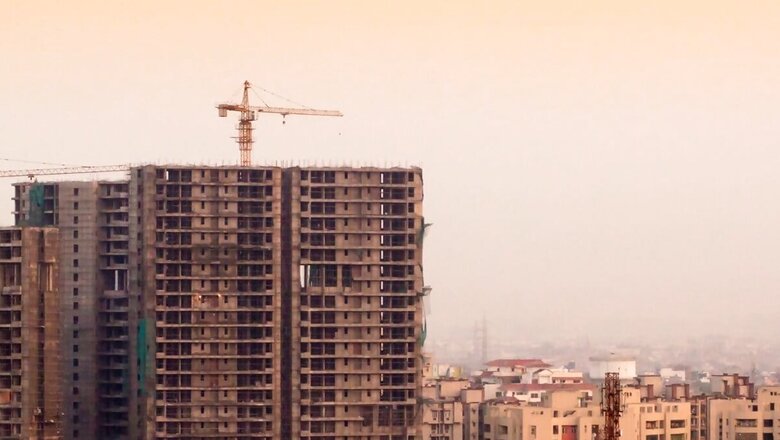
views
The coronavirus pandemic has already taken a backseat now. With this, people are moving towards investing in the best possible options. The real estate market in general and residential real estate in particular has seen a major upswing in the past two years, driven primarily by the pent-up demand, historically low-interest rates and innovative and flexi-financing opportunities presented by banks and HFCs.
Since 2018, the rupee has been on a falling spree, spurning the overseas demand from the NRIs. Given the global economic sentiments and market volatility, real estate has also emerged as the safest bet for anyone — way ahead of gold, stocks, mutual funds, saving accounts, and bonds.
According to the Ministry of Housing and Urban Affairs, India’s real estate sector was projected to be valued at the $200 billion market by 2021 and is likely to hit the $1 trillion mark by 2030, thus contributing almost to 13 per cent of India’s GDP. The sector also attracted foreign investments totalling $10.3 billion between 2017-2021.
The realty sector is the second largest employer in India, only after agriculture and is responsible for contributing about 7-8 percent to the GDP growth of the country currently. In sync with the same, the government is aggressively working on providing a myriad of subsidies specifically credit linked subsidy scheme (CLSS) for the affordable segment and reallocation of about Rs 15,000 crore under SWAMIH fund has been a major pivot in resuscitating the stalled projects.
The tax exemptions to potential buyers and their thrust to boost the Indian real estate sector over the last two years that has been witnessing a tremendous change along with the implementation of RERA and GST, all of this is expected to bring transparency in the system and gain confidence among the homebuyers.
Considering the above factors and keeping the view in mind that the Indian real estate industry is unaffected by external disruptors such as currency fluctuations and stock market upheavals, it becomes a stable avenue for investment for an average Indian. Immune to economic turmoil, the Indian real estate market is remarkably liquid and provides a steady stream of income for investors, while also giving them an option to mitigate their risks by diversifying their portfolios.
It is quite evident that Indians from all walks of life have unwavering confidence in the property appreciation prospects in the coming years. This is not only fuelling the demand for real estate, but also leading to appreciation of property valuation across major metropolitans across India. Additionally, rental income is a great way to supplement one’s income and can be a great source of passive income. It is no surprise then that the prices across the Indian real estate market remain steadfast and predictable for potential investors.
The Right Time to Buy Real Estate
In the recent years, property valuation across India’s top nine metropolitan cities — Mumbai, Delhi, Bengaluru, Kolkata, Hyderabad, Chennai, Surat, Pune, and Ahmedabad — has seen double-digit appreciation on an average. Due to the uncertainties faced during the pandemic, more and more prospective homebuyers have realised the necessity of owning a home.
However, this has also led to an exponential increase in construction costs almost increasing by as much as 12 per cent in the National Capital Region alone. Going forward this will negatively impact the Developer’s ability to offer the product at the same price as its available now.
On the supply side, sustained sales growth across major Indian metropolises has encouraged real estate developers to provide all modern amenities and integrate ecosystems. This is done explicitly to cater to the specific preferences of the next generation of homebuyers. Extrapolating current market trends, it can be forecasted with relative confidence that property values will continue to appreciate in the coming years. This, in turn, will have an additive effect on buyer sentiment and emerge as the linchpin that supports homebuyers in the future.
Government Incentives
The Indian real estate industry is the engine that drives the national economy. Every rupee invested in the real estate sector directly contributes to the national GDP. Recognising this, the government has also launched a number of schemes to promote affordable housing and make it easier for people to buy homes, such as the Pradhan Mantri Awas Yojana and the Credit Linked Subsidy Scheme.
A host of tax benefits, deductions on stamp duty and exemptions on the sale of a property have helped buyers offset the cost of purchasing various asset classes. These schemes offer financial assistance to millennial homebuyers, making it easier for them to afford their dream homes.
Rising Interest Rates
Real estate has historically been a good investment in India. While the real estate market goes through periodic cycles of property appreciation, the residential real estate market has witnessed a bullish run following structural improvements in the years preceding the disruptions caused by the pandemic. Additionally, the central bank has tightened the repo rate to check the obstinate inflation.
This had a cascading effect on home loan rates, rising interest rate along with elevated property construction cost has adversely impacted the product price. The downward swing in the interest rates in the coming quarters will provide buoyancy to the real estate market demand making it difficult for prospective buyers to enter the markets. Hence, right now is the ideal time to ride on the competitive interest rates being offered by Banks /HFCs this year until the market dynamics witnesses further changes.
Abundant Inventory
There are numerous high-quality development projects built by distinguished developers that are available across all major cities. From affordable, mid-priced to luxury, and ultra-luxury properties ranging from 2.5, 3.5, to 4.5 BHK apartments are cutting across various price brackets, there is a robust demand for both ready-to-move and under-construction projects. These include a diverse spectrum of asset classes ranging from low-rise apartment complexes to high-rise independent floor condominiums and from ultra-luxury townhouses to multi-purpose plotted housing projects.
Concluding Thoughts
The real estate sector exhibited exemplary resilience in the wake of the pandemic. The quintessential example of this was seen with both the residential and retail realty segments recording historic growth. The real estate sector has instilled confidence in investors and homebuyers alike as property sales increased by an astounding 40 percent across all nine metropolitan cities in India in both affordable and luxury asset classes. The demand for real estate by both domestic and international investors has surpassed pre-pandemic levels.
This increase in demand is likely to have an incremental effect on property prices, as 2023 is likely to see housing prices significantly surge from the preceding year. With volatility in input costs, uncertain global supply chain , economic uncertainties, and prevailing inflation rates, property prices will certainly rise in the coming year.
However the housing demand is not likely to dampen as potential homebuyers continue to invest in spacious homes with integrated amenities. With growing population, increased purchasing power, and rapid urbanisation becoming catalysts for the real estate sector’s growth, this year is likely to record unprecedented and ubiquitous growth. In a rapidly evolving globalised landscape, the Indian real estate sector is undergoing a radical paradigm shift. For any potential homebuyer still on the fence, there is no time like the present to invest in the home of their dreams.
(The author is the chief executive officer of Smartworld Developers)
Read all the Latest Business News here

















Comments
0 comment